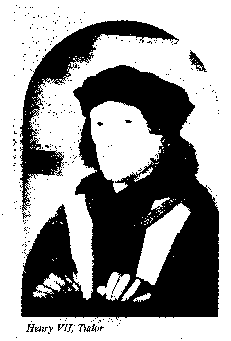
30
The end of the Wars of the Roses, the victory of Henry Tudor at Bosworth field and his marriage with
Princess Elizabeth, heiress of the House of York (1485) were the events that symbolized the end of the Middle
Ages in Britain. The year of 1485 is traditionally considered the watershed and the beginning of the Tudor Age.
In historical development the rule of the Tudors (1485-1603) with their absolute power in the long run
contributed to the strengthening of its role in international affairs.
The 16th century was the age of a growing absolutism of monarchy and centralisation of the state; these
phenomena facilitated the development and foundation of new capitalist relations in production.
The English type of absolute monarchy was shaped by Henry VII, who was opposed to the power of old
barons. He ordered that the old castles should be destroyed (pulled down) and the feudal baronial armies should
be disbanded. He was very rich with the confiscated wealth of his defeated rivals. He was strong enough to
prevent any revival of armed strenghth of any group of nobles, and he enjoyed support of merchants and small
landowners who had all suffered from the civil war.
These two groups, linked by a common interest in the wool trade not yet powerful enough to claim the
political power were to fight for in the 17th century. They were strong enough to be useful allies of the Tudor
kings and queens. Their support enabled the Tudors to become despotic rulers, while at first playing a
progressive historic role.
But their reign was abundant in various controversial arbitrary developments.
The financial policy of Henry VII
filled the Treasury and strengthened the throne and the church position,
improved the contacts with Rome. The King skilfully steered through the complexities of European politics.
His eldest son was married to the Spanish princess Catherine of Aragon, and his daughter Margaret to King
James IV of Scotland.
His son Henry VIII (1509-1547) whose court was glamorous with royal games, balls and entertainments,
development of culture, was among other things – a wasteful monarch, on his death his treasury was practically
empty.
Henry VIII's despotism was fatal for the country's progressive minds and terrible for his family.
The king invited to court outstanding people – humanists of the Renaissance period: Thomas More – "The
man for all seasons" – a play and a film with Paul Scolfield in the title role, the greatest thinker and the founder
of the Utopic Socialism (1478-1535). In 1516 he wrote a book about Utopia – the best government structure on
the Island of Utopia and was invited and appointed Chancellor. But Thomas More dared to contradict the King
and was beheaded. That was the destiny of many a Chancellor which made the post the most dangerous in the
country.
One could compare the fate of the Chancellors only with the destiny of the King's spouses, the Queens. The
plural of the noun is explained by the fact of Henry VIII's record number of wives, their fate is "humorously"
described by some school teachers with the following rhyme:
divorced, beheaded, died,

